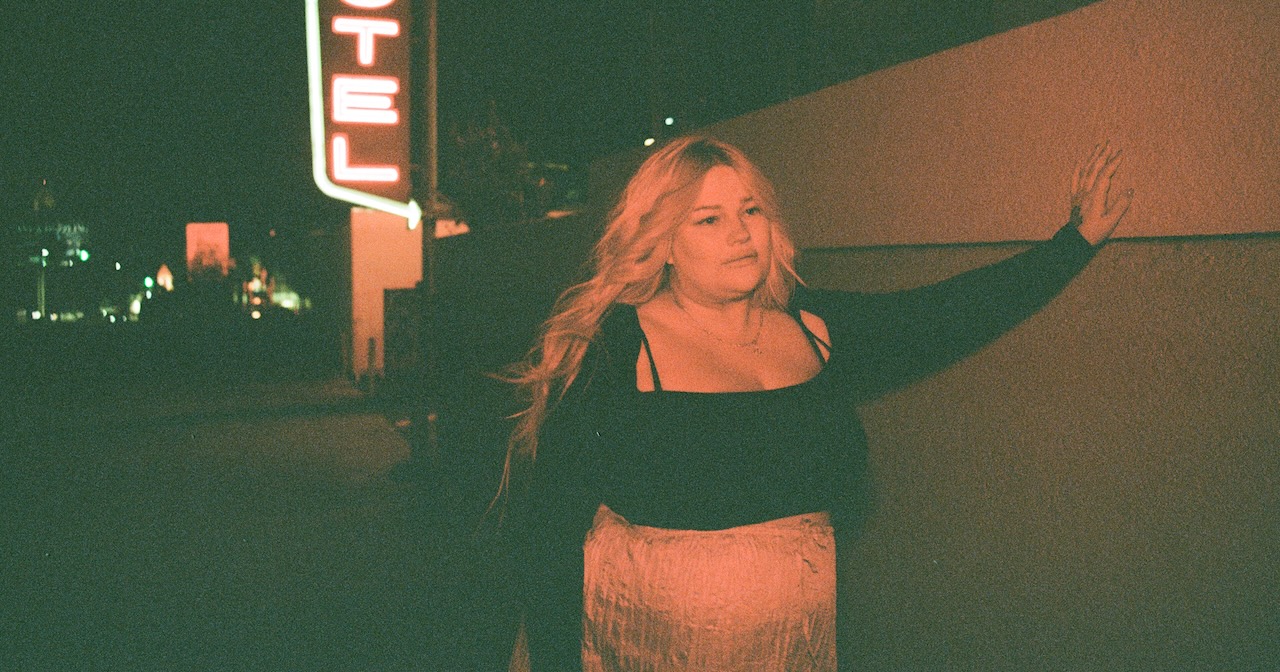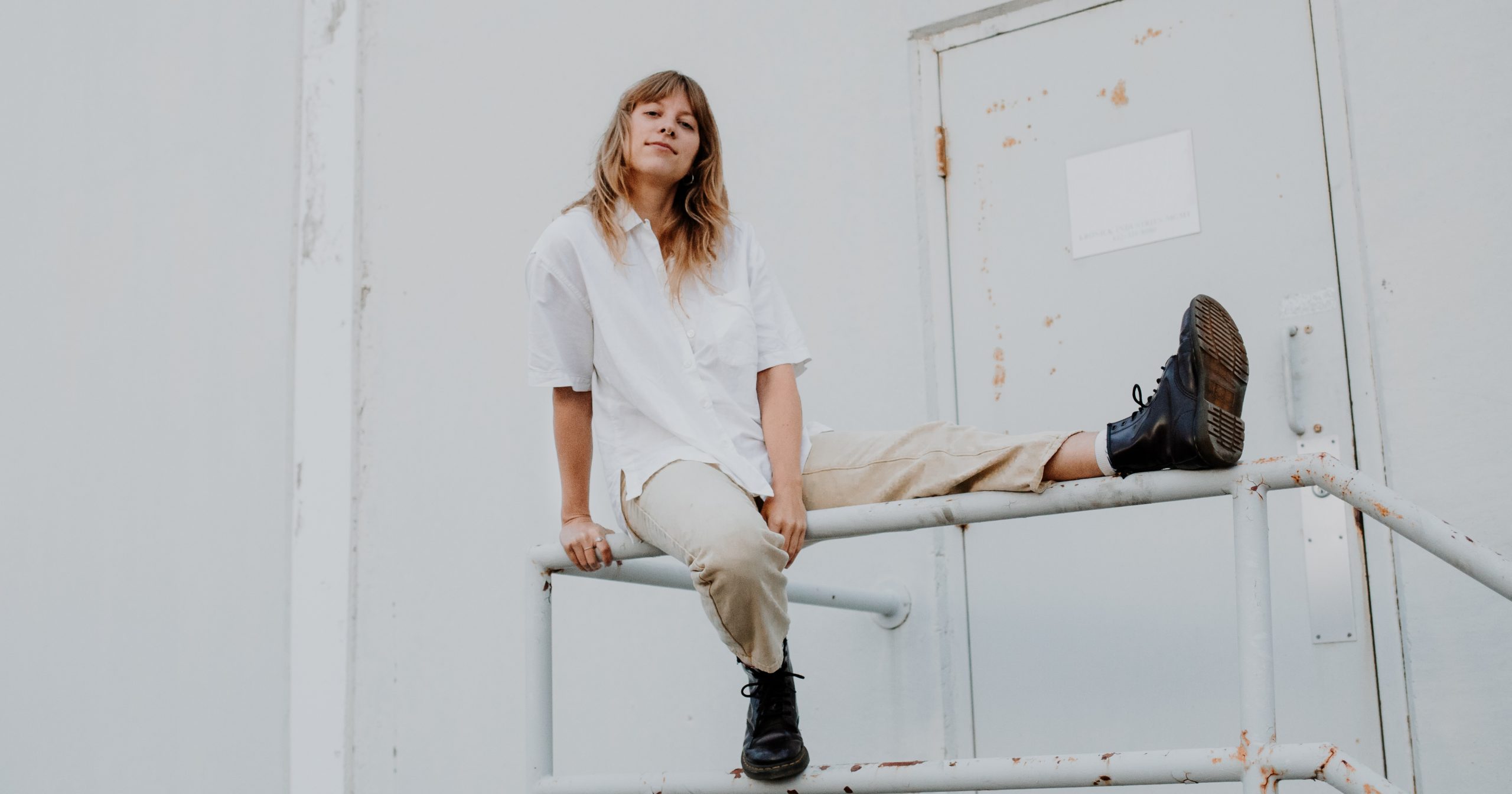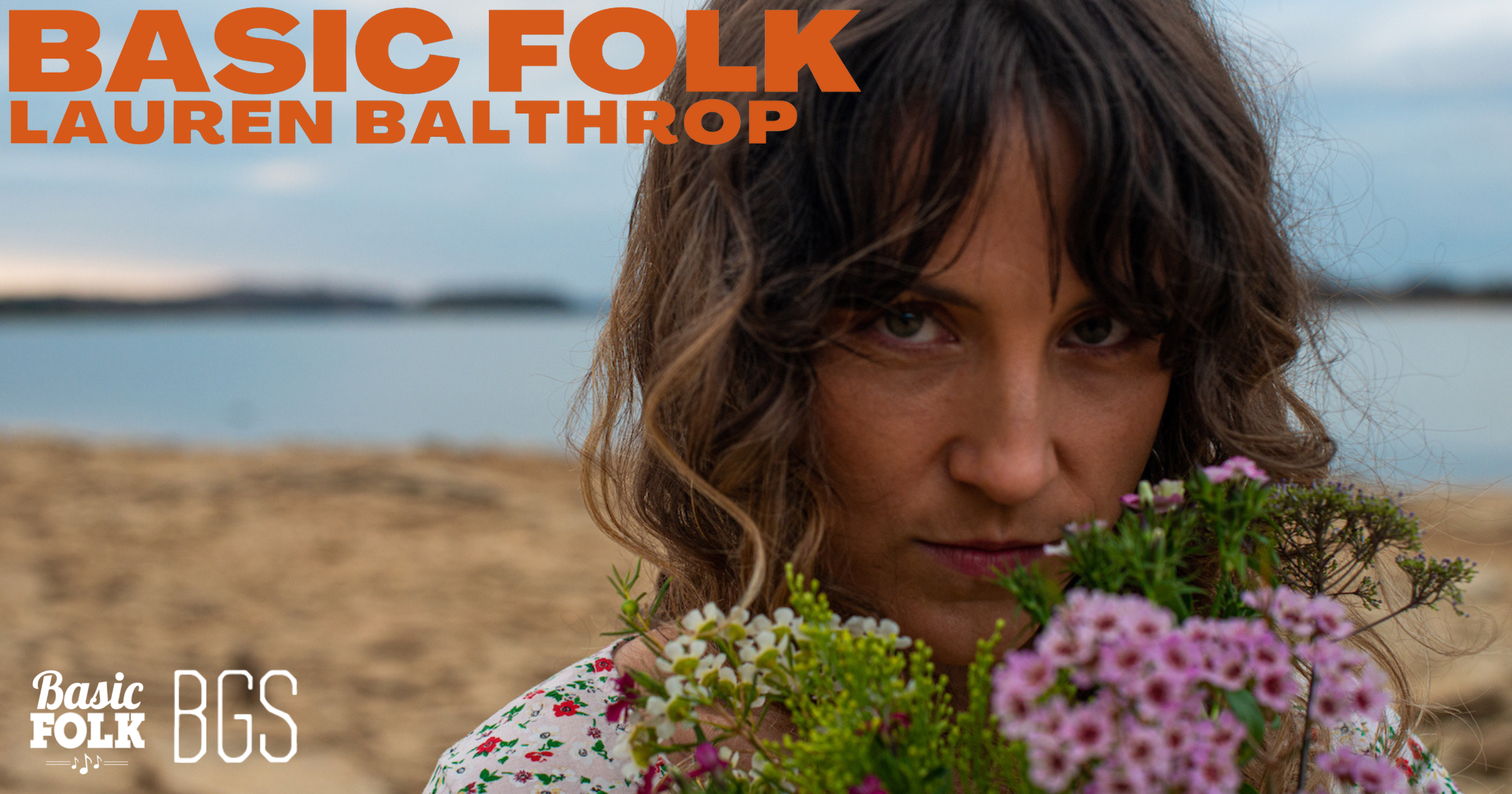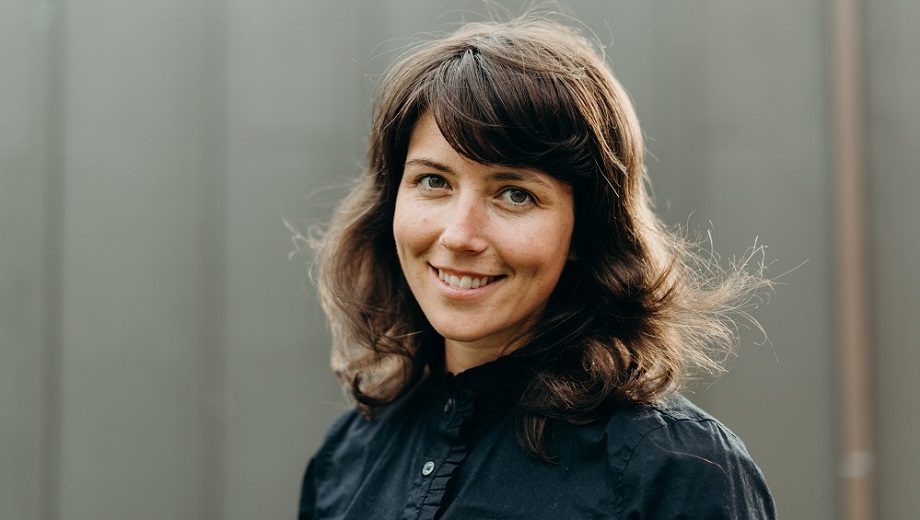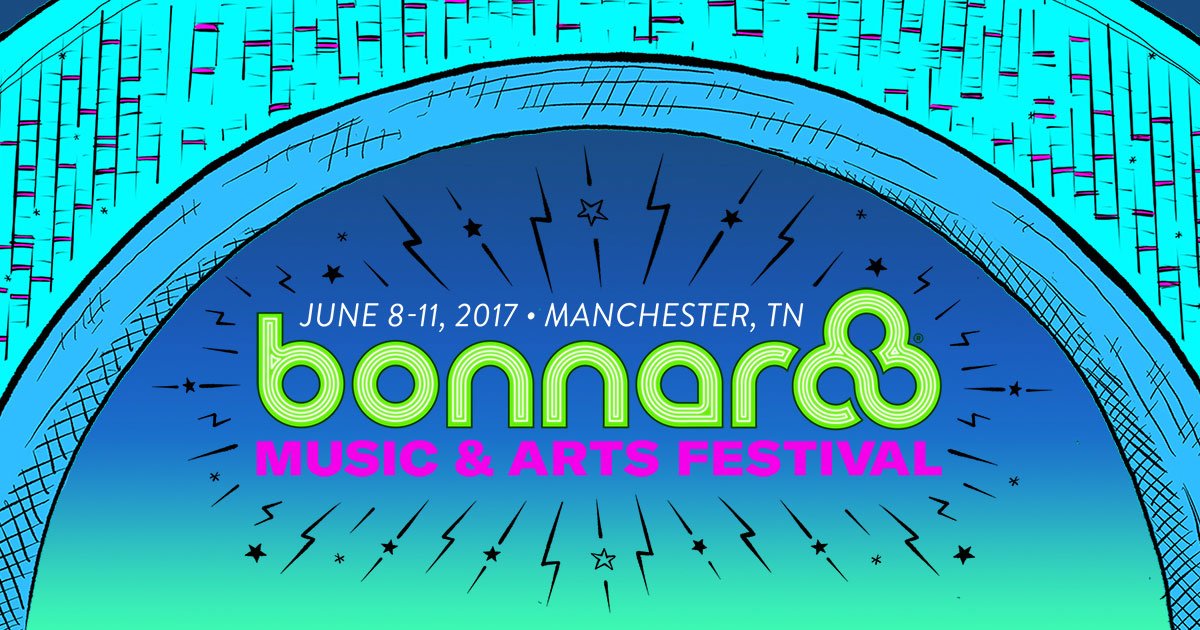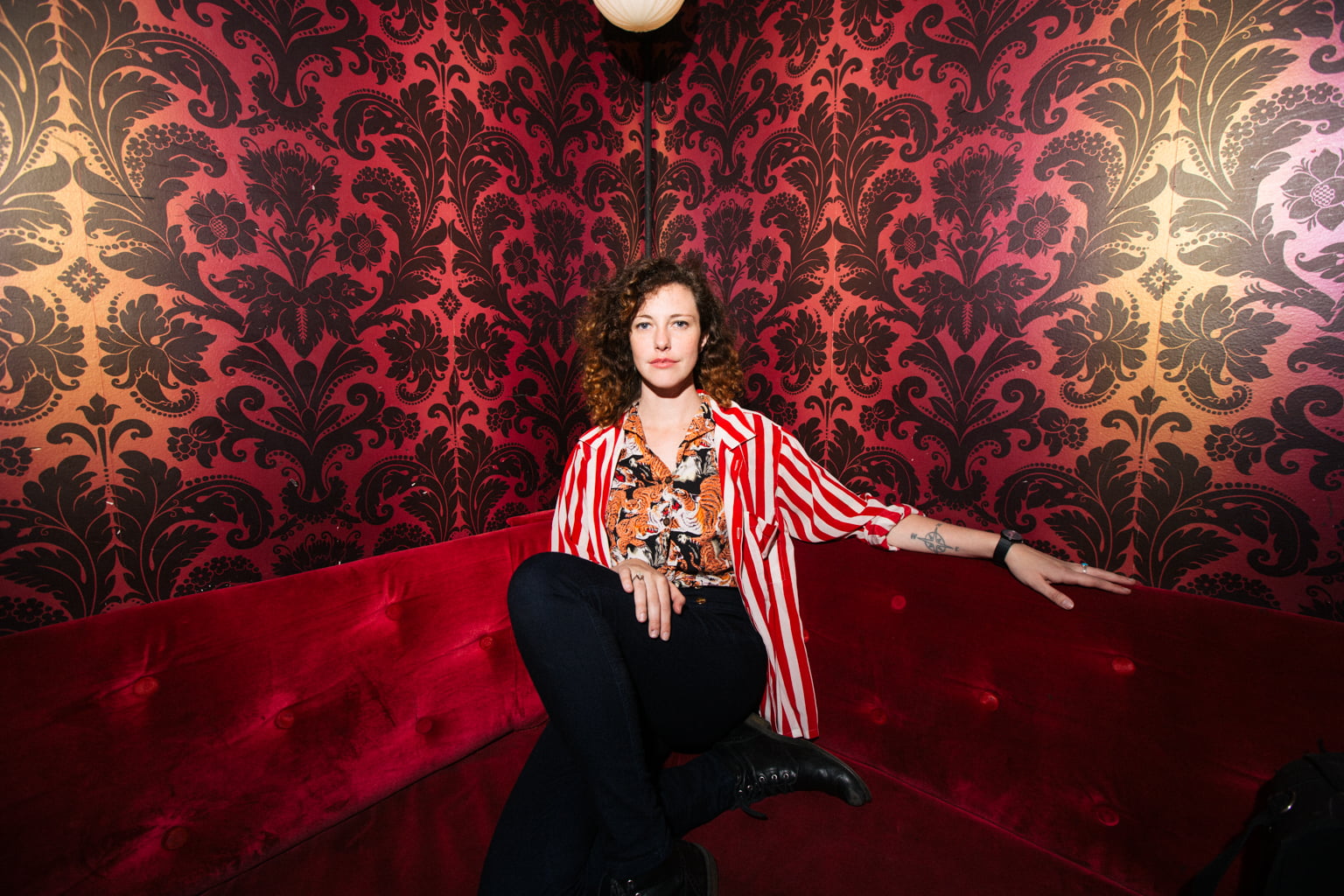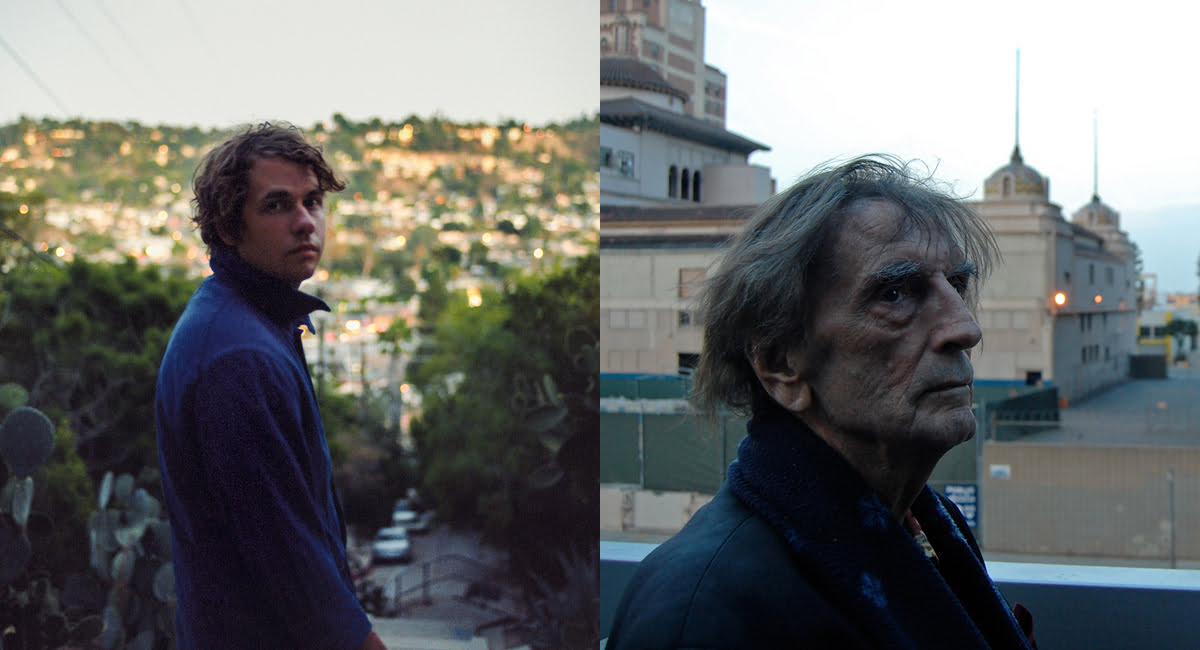I meet Swedish performer and singer-songwriter Sarah Klang in the glorious maximalist backstage area at Nashville’s the Blue Room before her first-ever Music City show in mid-January. She’s cozy on the couch, a tin of pouched nicotine by her side, a hippo skull on the coffee table in front of us, and her brand new album, Beautiful Woman (out February 7) on our minds. The first thing I notice – besides her beautiful tattoos and the shimmering gemstone stud on one of her teeth – is her gaudy and gorgeous red-white-and-blue acrylic nails. Complete with rhinestones and glitter.
To Klang, the country aesthetic is the “coolest,” and in her part of the world she’s seen as something of a country queen. Her work across her discography varies greatly in genres and sonics, including folk, indie, pop, Americana, and so much more. But Beautiful Woman, which was produced by Eric D. Johnson (Fruit Bats, Bonny Light Horseman) doesn’t feel like Klang is just putting on rootsiness because it’s “cool” or “in” or trending. These are sonic spaces she knows well and strides through with ease.
Beautiful Woman boasts bold and brash moments that feel like Adele covering The SteelDrivers alongside tender story songs that could have almost been pulled from the catalogs of country queens this side of the Atlantic like Loretta Lynn and Dolly Parton. Danceable tracks, finger-picked ballads, and honest lyrics speak to impactful issues of motherhood, agency, feminism, embodiment – and so much more – but still feel light and joyful, leaning forward in the beat and finding hope in the melancholic.
Catching her debut Nashville performance at the Blue Room felt a bit momentous, though Klang seemed remarkably chill and relaxed, on and off stage. She and collaborator Theo Stocks (who also helps record and produce her projects) performed in duet, with lush reverbs and simple backing percussion tracks to a rapt audience. An audience who knew they were lucky to have Klang on this “side of the pond.”
Before the show, we dove into Beautiful Woman, speaking about the death of genre, choosing your own joy, always wanting more banjos, and so much more.
Do you see what you do as roots music? How do you place your own music within roots or folk or Americana? Your music has so many things – it’s got moments of grandeur, it’s got moments of subtlety, it’s got indie, it’s got pop, it’s got a little bit of everything. But I wonder how you identify it.
Sarah Klang: That’s sort of a really hard question. I always feel it’s a little bit like I don’t really know the genres. So, mostly when I put out my albums, afterwards people will review them and they will tell me what genre it is and I will be like, “Yeah, yeah! Mhmm, that’s what it is.” Because I don’t really think about it.
I mean, I listen to so much– random indie, folk, Americana, all those things that you mentioned. And I’m introduced to iconic classical things mainly through Theo [Stocks], my guitarist that I make albums with, and also Eric [D. Johnson]. Like a very normal thing in the studio would be that they would say, “Oh, this is very Kris Kristofferson-ish.” And I would be like, “Could you play it for me?” And then they play the song, and I’m like, “Okay!”
I don’t really have a special aim for where I’m going, because I don’t have any roots in anything. Really. I know what I like. I know the feeling [of what] I’m after. I guess the sentimental [and the] bittersweet, those always end up in some sort of Americana thing.
If it’s not the genre, or style, or the aesthetic that you’re going for – or that you’re following – it sounds to me like you’re following the songs themselves and the feeling you’re trying to evoke.
Yes. I mean, it’s just like an imprinted thing in my brain, “What sounds do I like?” It has always been like that, really. I don’t really play any instruments anymore. I used to play the guitar and the piano, but now I don’t. We’ve been here [in Nashville] for seven days and had sessions every day and Theo knows very well how to describe [the sounds]. He’s kind of like my interpreter. How do you say it? My interpreter? When it comes to melodies and shorts [takes], because someone at the session could play me a bit and I’ll be like “Hmmm?” And Theo will say, “It’s the last short. She doesn’t want that last short. Let’s go with that instead.” He understands.
I think I just have quite a small range of melodies that I like. I mean, my songs are kind of similar, how they are made. The aesthetic of country music has always felt like that’s the only way to go. That’s the only aesthetic that really looks cool, you know? When I started to dress up in country-ish things in Sweden, people were like, “Okay, well she makes country music.” That’s how far they would go. So in Sweden I’m often categorized and called the country queen of Sweden. I get a little bit nervous about that, because I know so little about country music and you know that everybody has such strong opinions about it.
What’s funny to me is even with how strong of opinions people have about country and what it is, it’s always in the eye of the beholder.
I’ve obviously been listening a lot – maybe not classic country, whatever that is – but I mean, I’ve been listening to Kurt Vile, Kevin Morby, Sharon Van Etten, you know, those very big country rock people for a long time. I think that is my biggest influence, really. Then we take that and Theo and Eric on this album, who are just very nerdy in music, they put their spin on it.
But for me, it’s not important to me. Where this album lands, in which genre – I couldn’t care less. But, I think that’s why I started having a western aesthetic. ‘Cause it’s the coolest part, I think. I was like, “Okay, I’m gonna start a solo project. Where do I want to be? What’s cool?”
That, probably. [Laughs]
You’re talking about collaborating with Theo and Eric and it sounds like having that trust and having that rapport is really important to getting the music where you wanted to get it. When I listen through and I hear the banjo moments and the really rootsy and Americana moments, trying to connect the dots, how much of that came from Eric producing?
I asked for that specifically! I mean, if it were up to me, I would say, “More banjo! Put banjo on everything!” ‘Cause that makes everything a jam.
But the boys are more tasteful when it comes to that. When [Eric] played, I think I asked him to try and play on like every song – and not because I wanted to be a “diddly doo” out there, but just because that’s my vibe. I mean, when someone plays on a banjo, there is nothing more tearjerking.
Of course, “Last Forever” jumped out at me for that quality. That was the track from Beautiful Woman that we premiered on BGS. I think it’s my favorite song on the record. But there are so many moments that feel like you’re a genre shapeshifter. And I think that that’s the time we’re in too, genre’s dead. Even while we get more and more and more genre names every year, it feels like genre’s dead.
For me, it’s probably a good thing that it is. That I’m not locked in a genre. I don’t think I’m ever gonna have to be like, “Okay guys, I’m breaking free from this [genre.]” I don’t have to do like a Miley Cyrus thing – “look at my new clothes!” – because I wear everything and that’s nice because I think I’m gonna keep on producing albums as long as I can, and I would like to not be stuck if I were to start feeling this [genre] is boring.
I mean, I’m a huge house fan. I love dance music. When I was a teenager, I mostly listened to weird party drinking music from the UK. I always wanted to make a club album. So, hopefully I could just like sneak over there. When the time’s right. [Laughs]
Another song that jumped out at me as feeling really rootsy is “Childhood.” Not only because of the aesthetic of the song, but the storytelling of it and the nostalgia in it. Something about it feels kind of theatrical to me, too, and I think country is so theatrical.
Yeah, it’s very dramatic. I think when I’m making a song, I feel like “more is more” and if you are going in a certain direction, just go all-in and don’t cringe. Because then it’s just going to end up in some halfway world.
For me, with “Childhood” I was like, “Oh, is this song too nice? Is it too sweet?” Like, no! It’s great. It’s a great song. You just have to go all the way with the feelings. Because then if you don’t, I don’t think you’re going to reach the point you wanted to reach.
Many of my melodies, when I write, I ask myself or Theo or Eric, “Is this too pop-y? Does it sound too much like yada yada yada? Is this a rip off?” And they’re, “Let’s go for it!” You just go straight into that vibe and feeling.
Our music goes all the way into the feeling without hesitating if it might be too much. If you are driving your car, you want to listen to Tom Petty. And he wasn’t like, “Oh, I’m gonna write a song that is making people feel free… but it can’t be too much!” [Laughs]
“I want a driving song, but for 35 miles an hour.”
No! [Laughs] Pedal to the metal.
The overarching concepts that the album is talking about, I think what some people, especially in the U.S., would think these are deep topics – feminism, womanhood, gender and gender roles. But I found it interesting that even with these subjects, the music still feels joyful, it feels like it’s looking forward, it feels like it leans forward – in the beat, literally and figuratively. But, it doesn’t feel like cotton candy, and it doesn’t feel like you’re minimizing anything. Can you talk a little bit about that?
I mean, that makes me so happy that you felt that way. I’ve done interviews about this album in Sweden, with women, and they’re like, “Sarah, you do know that you are a beautiful woman now, right? And I’m like, that’s not the fucking point! As if I were singing it, meaning that that was the point. Maybe I thought when I was younger that that was a goal, but it’s not now.
I just want to write whatever comes to mind, and since English is not my first language, I have to write it very straight and simple. Like, “This is what happened, period.” I don’t really have the energy or time to hide the message. That is not my thing. Some people are great with that, leaving clues. I just write words – it’s also like, I’m busy I need to write the lyrics now! [Laughs]
I always ask my friend when I’ve done an album, “What is the catchphrase for this album? What would you say now when you heard it?” So, for VIRGO she was like, “This is your sex album.” And Mercedes, “This is your pregnancy album, obviously.” But this one, she was like, “I think this is a celebration of girlhood, period.” And I was like, “Yep, that’s perfect.” I’ll just use that. Because I obviously just collect songs. Over a period of time, and then I feel, well now it’s done. And I don’t write an album after a theme.
One of the things I love about the album is that it ends on “I Have Everything.” I like that that’s the way that you’re putting a punctuation mark on the album. Right now, I’m really worn out by attention economies, consumption, consumerism, and like, “buying our happiness.” I was really struck by that song. I love having it at the end; it feels like you are not just talking to us, your listeners, but you’re also talking to yourself. So I wanted to ask you about the song and about the placement of it in the sequence.
I think I wrote it to myself. Like, “Listen! Stop being a complete asshole all the time!” It’s annoying, but I’ve learned – and it’s nice, but it’s hard to talk about it without it sounding so cringey and boring – but the only thing that makes you happy is to take walks outside, be with your family, eat right, and take care of yourself. And that is boring, but it’s the truth. I always felt that people who said, “I wake up every morning and tell myself five things that I’m grateful for–” and I’m like, “Okay… that’s weird.” [Laughs]
If you do that, you will probably feel better. If you are nice to people around you, you will probably feel better. If you’re nice to yourself. I mean, grown up people have been telling me [this] all my life. During my 20s, through periods where I was just unhinged and didn’t feel right. They were like, “Well, maybe if you took a little better care of yourself and didn’t party so much and spent time with your family, you would feel better.” And I was like, “Listen, it’s more than that.”
Yeah, like I am so deep. [Laughs] My traumas are so deep! You have no idea! I’m a fuck up. And then, turns out you’re not. That’s a nice thing about getting a little bit older, you just know, “I’m gonna be fine.” And it’s also my responsibility to make that happen.
Every time somebody had ever told me that “joy is a choice” and “happiness is a choice,” I didn’t realize at first that what they meant was joy or happiness that you construct for yourself isn’t fake.
No! And it doesn’t undermine your sad parts. Like, that is always going to be there. Don’t worry. I think so many of us are just melancholic people. I mean, people have had worse experiences than I’ve had and are so chill and so fine.
I think happiness is definitely something you can work on and give to yourself, and it’s not like a miracle.
Photo Credit: Fredrika Eriksson
